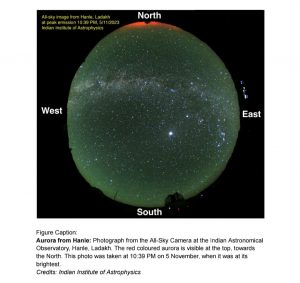Auroral activity seen at Hanley Ladakh.

Leh, Nov.9.2023: Indian Astronomical Observatory (IAO) at Hanle and Merak in Ladakh captured images of an intense red coloured aurora on November 5. The Observatory is run by the Indian Institute of Astrophysics (IIA), an autonomous institute under the Department of Science and Technology, Govt of India.
An aurora is a glorious curtain of light that is usually seen from high latitudes like Scandinavia, and they are not expected to occur at lower latitudes. They occur due to the interaction between the Earth’s magnetosphere and the incoming solar wind that carries charged particles and magnetic fields. A Stable Auroral Arc (SAR) is red in colour as opposed to the usual green-blue curtains of light seen from high latitudes. What was seen in Hanle, as well as from multiple locations around the world, has been attributed to a SAR event.
Engineer-in-Charge of the Observatory, Dorje Angchuk said that IAO at Hanle, Ladakh operates multiple telescopes and also has an All-sky Camera that images the entire sky constantly. This camera was able to capture the intensely red coloured aurora in multiple photographs. He furtjer added that the red auroral light could be seen towards the Northern horizon from 10 PM till midnight of November 5 and its intensity peaked around 10:40 PM.
He also informed that a similar camera in Merak, on the banks of Pangong Tso in Ladakh (which is the proposed site of the National Large Solar Telescope), also captured this light, though it was limited by higher mountains towards the North.
Director of IIA, Professor Annapurni Subramaniam said that Hanle is at the centre of the newly notified Hanle Dark Sky Reserve, which attracts the public for astro-tourism due to its extremely dark skies. Further, she added that such beautiful photographs of rare events add to its appeal.We look forward to studying many more auroral activity from Hanle, especially when the Sun is in its active period.


